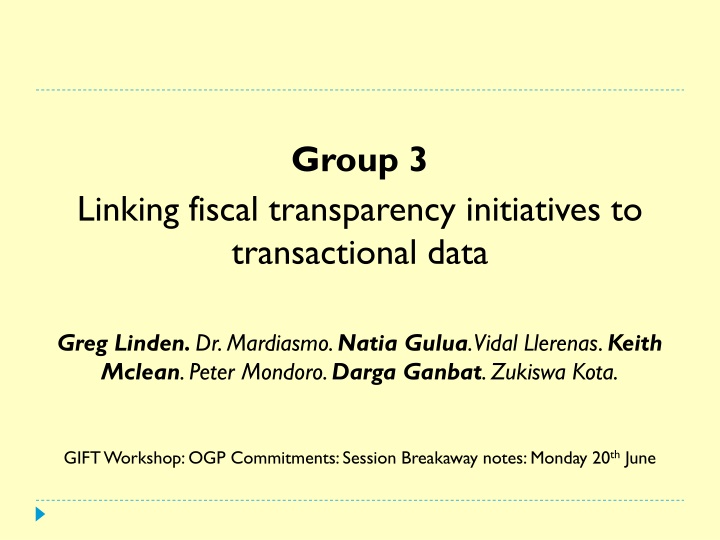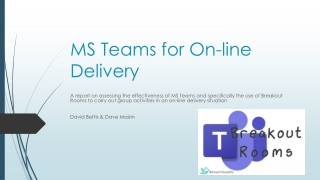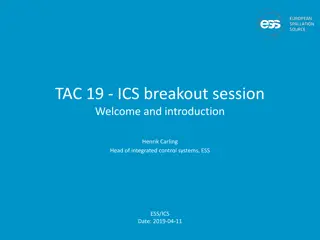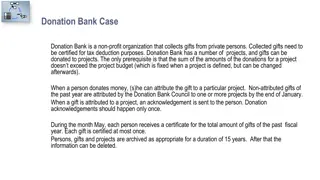
Linking Fiscal Transparency Initiatives to Transactional Data: Key Considerations and Lessons
Explore the significance of linking fiscal transparency initiatives to transactional data, emphasizing the need for clear budget information, tax revenue transparency, and lessons learned from various systems worldwide. Discover how results-based budgeting and public engagement play crucial roles in achieving transparency in financial processes.
Uploaded on | 7 Views
Download Presentation

Please find below an Image/Link to download the presentation.
The content on the website is provided AS IS for your information and personal use only. It may not be sold, licensed, or shared on other websites without obtaining consent from the author. If you encounter any issues during the download, it is possible that the publisher has removed the file from their server.
You are allowed to download the files provided on this website for personal or commercial use, subject to the condition that they are used lawfully. All files are the property of their respective owners.
The content on the website is provided AS IS for your information and personal use only. It may not be sold, licensed, or shared on other websites without obtaining consent from the author.
E N D
Presentation Transcript
Group 3 Linking fiscal transparency initiatives to transactional data Greg Linden. Dr. Mardiasmo. Natia Gulua. Vidal Llerenas. Keith Mclean. Peter Mondoro. Darga Ganbat. Zukiswa Kota. GIFT Workshop: OGP Commitments: Session Breakaway notes: Monday 20thJune
Linking fiscal transparency initiatives to transactional data Acknowledging both sides of the equation Noted that while there may be progress is aspects of programme delivery what does it mean when expenditure and fiscal transparency components are weak?
What do we need to consider Important to link budgets to results; emphasise results-based budgeting Allows tracking of results/performance Allows tracking of clear objectives and indicators Use of solid indicator systems allows effective targeting (example: Georgia case) Need clear information for public engagement; enriched budget data Methodology Timeframes Costed activities
What do we need to consider (2) Tax Revenue Transparency Analysing/monitoring revenue generation is important Not enough focus on this despite significant implications tax compliance increases resources available for public services expenditure To counter privacy concerns- tax revenue data can be aggregated for public consumption Results-based budgeting Publish enriched/detailed information Need to determine deviations and reporting requirements Need to keep value for money questions at forefront Budget execution link:what has been achieved?Why?Why not?
What do we need to consider (3) ..and what lessons can we build on? The outcome is as good as the system that produces it Examples of learning areas: Papua New Guinea and 3 different systems used simultaneously Georgia and e-tenders/procurement South Africa and e-procurement systems Mexico and open contracting Mongolia and CSO participation in contracting/tenders
Our GIFT-list Introduce tax revenue transparency into discussions transparency of contracts, benchmarks and milestones Punitive mechanisms for non-compliance (eg PNG toothless Fiscal Responsibility Act) Creation of benchmarking system /key milestones that that should be expected/met within the contracting space Tedious and lengthy for governments but all parties must step-up e.g CSOs and public procurement agencies 1. 2. Uploading approved contracts online; open e-contracting Involve line ministries and implementing agencies Promote/support downstream civil society engagement and monitoring Technical support to CSOs to develop tax revenue monitoring skills 3. 4. 5. 6.






















